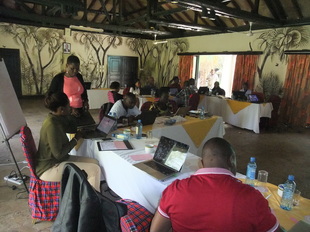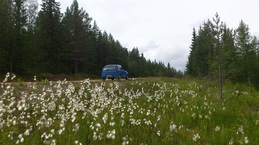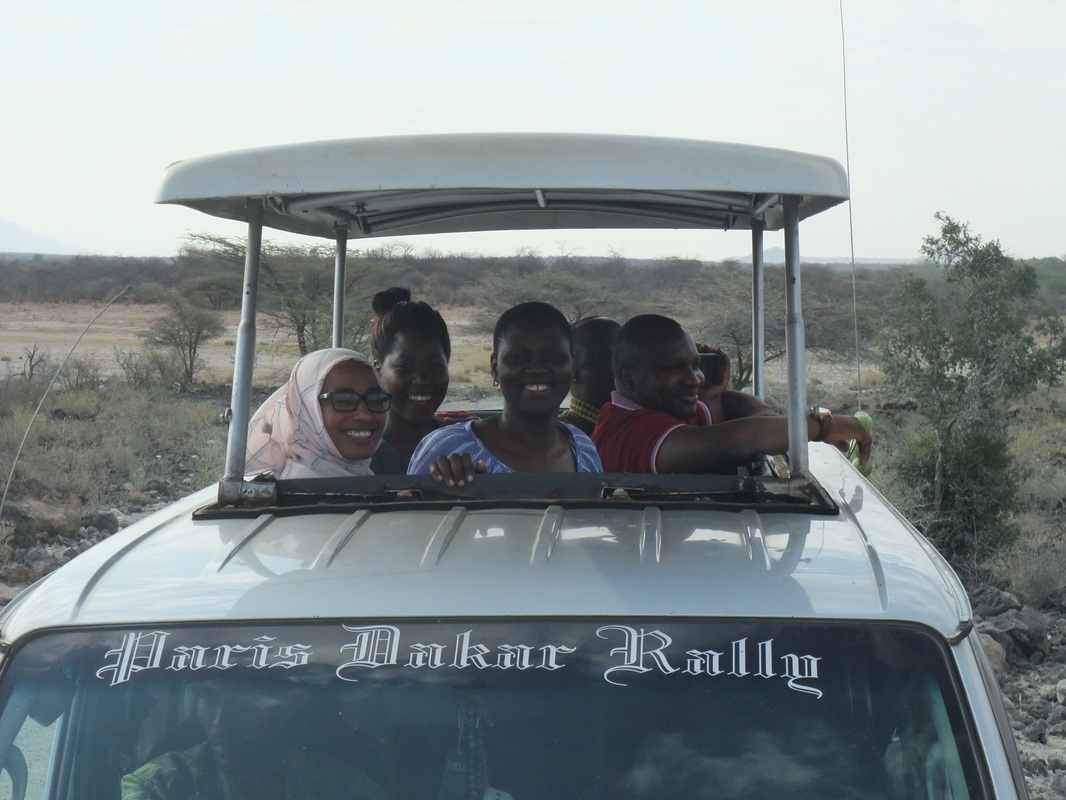 Right after my holiday ‘work’ was awaiting. While my wife was to take on a whole new contingent of fresh kids at high-school, I was to be part of a 'herd' of NGO staff members in one of the national parks of Kenya. I facilitated a training in Sarova Shaba Game Lodge, which is located near the town of Isiolo, in Shaba, one of Kenya’s biggest national parks. It remains one of the best parts of my work, to be able to see places and meet people. The training I facilitated is part of a program that promotes constructive dialogues between decision-makers and vulnerable communities facing the dramatic consequences of climate change. A week before the training when the training venue was confirmed I had some serious doubts. Were there no hotels in Nairobi to accommodate us? What about our carbon footprint taking us 300 kilometers into the Kenyan landscape? And would the cost of the training not increase considerably staying at a high-end hotel? My calvinistic work ethics played-up again I guess. Once amidst zebra’s, elephants and giraffes along the Ewaso Ngiro river, and seeing pastoral communities along the roads herding their goats and camels, I realised there was no better place to conduct this training. Not only did it manage to keep people in the training room, away from other obligations and priorities that would appear at any given time should the training have been in Nairobi. I also underestimated what local networks can deliver. The program coordinator, originating from the same area which is also one of the program areas, had ably negotiated a very low fare, which easily beat hotel fares in Nairobi. The conference facility was well equipped and bordered a very peaceful shallow water pool with fishes and turtles to keep us company during the coffee-breaks. Rooms were located along the river with crocodiles and other reptiles regularly appearing ashore and baboons jumping the trees. Being focused on the training itself, I had not scheduled for any tour or recreational activity. Nevertheless the program coordinator arranged for a game drive one late afternoon from 5 to 7 pm, when the animals started moving again, and it was good she did. The number of elephants, giraffes, gazelles, zebra’s and buffaloes we encountered was impressive and with the help of one of the park rangers we even managed to spot a lion. Various birds surrounded the predator waiting for their turn and telling the ranger about the whereabouts of the lion. The very presence amidst so much beauty that is being endangered by climate change underscored the relevance of our program that is promoting landscape approaches and river basin management, bringing the various (often conflicting) interests together, while protecting wetlands that fulfil a crucial role in wildlife conservation. Naturally we also could not escape the usual cultural dance at a closing dinner pretentiously called a bush camp fire dinner, which given the security measures around the hotel grounds could hardly be referred to as being in the bush. However, not after one Samburu men introduced us to Samburu culture using beamer and screen, which contrasted surreally with his traditional clothing and the nature in its direct surrounding. It was also good to note that not only to me his story was new, but also most of my Kenyan and Ugandan colleagues, having various backgrounds, were similarly enjoying the exposure. On the trip back to Nairobi, as part of conversations about family life in Kenya and Holland, I was told that the sudden drop in international tourism, following the terrorist attacks of Al Shabaab, had finally opened up places to Kenyans. In the past multiple places where exclusively accessible to foreigners and Kenyans were not welcomed. Today, the middle-class in Kenya is the thriving engine of the tourist industry, and are equally met with hospitality services. All in all, the training was an experience of good friendship and great change potential given the active participation during exercises and consultations between the two country teams and creativity displayed. Thank you Kenya and Uganda for welcoming me allowing me to be part of your journey. At the closing dinner I received, as a sign of appreciation, a Samburu name: Lepario (the blessed one). I could not agree more.
0 Comments
Long distance running, for years the domain of East Africa. Kenya and Ethiopia competing with each other for victories at world championships and Olympics. This week Almaz Ayana crushed the world record at the 10.000 meter womens final at the Olympics in Rio with 14 seconds in an astonishing run setting the major part of the field on a lap behind. I must say that I feel ashamed of reactions given by my compatriots participating in the race, questioning the cleanness of the win. When asked about the allegations, Ayana smiled. "My doping is my training," she said. "My doping is Jesus". This reminded me of the time we lived in Ethiopia where we witnessed the strength of Ethiopian women walking to church early morning prior to starting their days, spending their time in prayer. However only faith won't do the job as Almaz acknowledged by stating that her doping is her training.
A bit of research on the internet brought me to Bekoji, a small village in Arsi zone in Ethiopia and the birth place of Ayana and also of Dibaba her competitor during the race and many other great Ethiopian athletes. Bekoji, with just over 16.000 inhabitants, already produced 10 gold medals in international competitions. The documentary Town of Runners** point to one men: coach Sentayehu Eshetu. His lifelong commitment to his village and to running has paid off. The documentary shows the direct link between hardship (Arsi zone often hit during emergencies, appearing in many humanitarian appeals) resilience building and ultimate victory. The region is also known as an important coffee growing area, a cash-crop that could provide for good income should seasonal rains follow their normal pattern. However, El Nino has also affected Arsi zone and more and more people had to diversify their livelihoods, with very few alternatives at hand. In that perspective the enormous drive for running of Bekoji can also be considered an important coping strategy to deal with hardship and impact of climate change. Running though an individual discipline gets a communal translation in the Ethiopian reality, which is also witnessed by the warm togetherness of the athletes after the race. It exemplifies to the world and to Ethiopia itself as well that sticking together is the best option in the face of hardship or competition over scarce resources, showing that a strong community is an important stepping stone in resilience building. Today causes me to compare the Ethiopian athletes with my compatriots competing in a number of disciplines. The enormous support infrastructure available not necessarily translates in an equal amount of golden medals (though being a small country with just over 16 million people). *) http://www.espn.com/espnw/voices/article/17286920/ethiopian-runner-almaz-ayana-stuns-olympic-crowd-10000-meter-world-record **) http://www.townofrunners.com/  The holiday season was much welcomed this year amidst so much turmoil. It almost felt surreal joining a fleet of travelers to distant places to take a vacation. However, real vacation requires to disconnect from the global. BBC World travels always with you and so does CNN or other international news channels. Even trying the local news in Scandinavia, I was reminded of the 5th anniversary of the horrible events on the 22nd of July in Norway, where 5 years ago Anders Breivik showed that extremism is not limited to Islamist radicals capitalizing on discontent of young Middle-Eastern men. It just struck me how many youth and adults in the three holiday resorts that I visited during our Scandinavia tour are glued to their smart-phones, basically continuing gaming, watching series and having their usual 'social' talk as if they were still at home. The only way to really feel 'away' would be to disconnect from any media. Not to be taken to Rio, but to stay at home really. In searching for 'things to do' it is much more fun to visit a local Tourist Information office. I guess even your home town could become more interesting doing so. Switching identities is the trick I guess. Not carrying your whole digital identity with you while searching for things to do may offer a refreshing list of events, concerts and the like. Admittedly, being online even right now to type this blog gets me in touch with my work again somehow, though still one more week of vacation to go. The nature of my work even did not allow me to fully disconnect this week, having to prepare for a training in Kenya. And even during holidays considerations in terms of CO2 emissions are to be part of decision-making. A car-tour through Scandinavia may not have been the best option... Today I heard a sermon in church connecting work with enjoying the good life, much applying to this holiday season: For everything there is a time...
|
About meMy name is Reinier van Hoffen. U®Reading
Click here for a summary.
Also find the text of a lecture Dr. Achterhuis held at the 2012 Bilderberg conference. Archives
August 2022
|
AddressNachtegaallaan 26
Ede, the Netherlands |
Telephone+31 (0)6 1429 1569
|
info@uraide.nl
|


 RSS Feed
RSS Feed
















